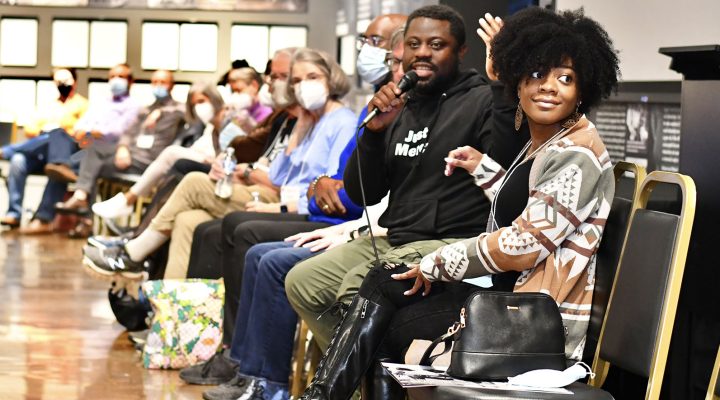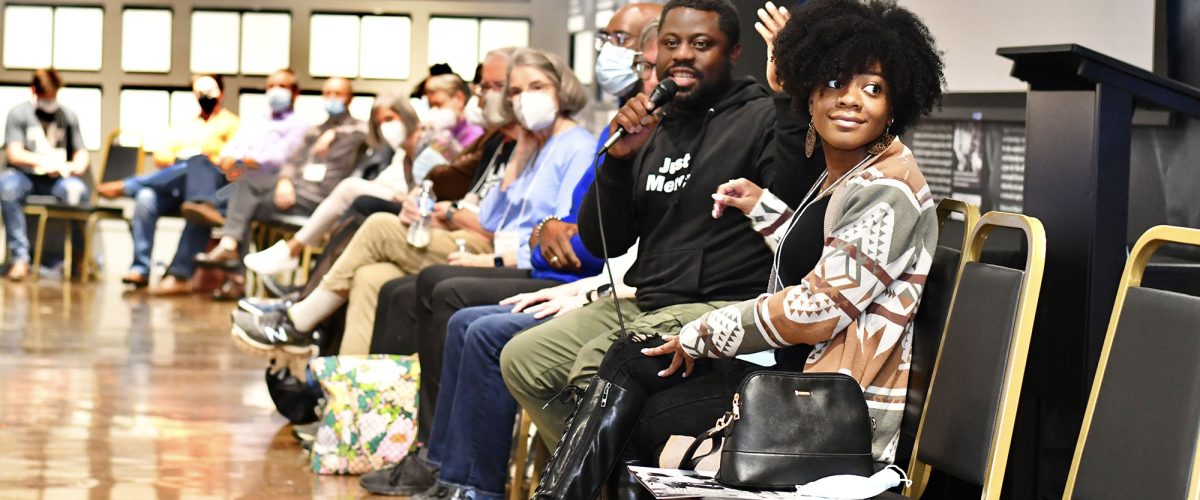The coming year will be filled with the challenge of intense anti-slavery work for the Alliance of Baptists if its 2022 fall gathering was any indication.
The session was held Nov. 10-12 in Montgomery, Ala., where about 150 participants attended lectures and workshops covering the history of slavery and white supremacy, the Baptist role in those systems and how they continue to play out in modern U.S. institutions and culture.
The setting for the event was the Legacy Museum: From Enslavement to Mass Incarceration, which traces the legacy of slavery, lynchings, Jim Crow, police brutality and other forms of white supremacy in America. This was an ideal place for the Alliance to formally launch into a new chapter as an anti-racism organization, said Elijah Zehyoue, co-director of the Alliance.
“We can do something about what’s going on today. Racial violence and white supremacy are still in our midst. So, the hope is this event would enable us to be more committed and better equipped to do the work of anti-racism.”
That journey began with the 2021 rewriting of the Alliance’s covenant to confess its historic part in racial and economic injustices and to commit to dismantling patriarchy and white supremacy. The 2022 fall gathering — titled “Excavating Our Roots” and the first to be held in person since the pandemic — was the first major expression of that new commitment, Zehyoue said.
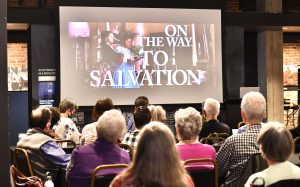 “The hope was to introduce the urgency of this work and provide the motivation to do the work that is required to dismantle white supremacy in our society, in our world, in our churches and in ourselves.”
“The hope was to introduce the urgency of this work and provide the motivation to do the work that is required to dismantle white supremacy in our society, in our world, in our churches and in ourselves.”
A big part of that motivation comes from understanding the role Baptists played in slavery and the systems of oppression it spawned, said Zehyoue, who delivered a lecture on the history of church involvement in providing theological and political cover for white supremacy from the 1500s onward.
“Then we spent some time at the museum to take in that history,” he said. “If we were going to live into this call to be an anti-racist organization, we needed to spend a little bit of time looking at the ways in which we have been a part of systems and institutions that have contributed to a history of racial violence, white supremacy, racial injustice. And we had the moral obligation of looking within.”
Even those who were familiar with the history of racism in the U.S. were exposed to a deeper level of white supremacy’s influence, said Nancy Sehested, a retired pastor and former board member of the Alliance. “We were seeing the impact of the violence of racism and how imbedded it is in all our institutions, including the church. We were seeing things in a new way and making those connections.”
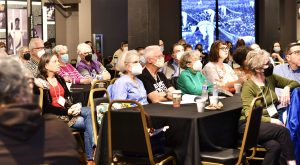 It was deeply troubling to learn, through lectures and museum exhibits, the white supremacist connection between slavery and modern-day mass incarceration which resulted from the war on drugs waged in minority communities, she explained. As a result, “Excavating Our Roots” definitely achieved its goal of providing motivation to do anti-racism work.
It was deeply troubling to learn, through lectures and museum exhibits, the white supremacist connection between slavery and modern-day mass incarceration which resulted from the war on drugs waged in minority communities, she explained. As a result, “Excavating Our Roots” definitely achieved its goal of providing motivation to do anti-racism work.
“It was visceral — a full emotional, mind, body and soul experience. It absolutely makes you angry,” she said. “You think, this should have been stopped before anyone was captured and put on a slave ship. And then you say these horrors shouldn’t have continued for generations and generations. And you would have hoped the Civil Rights movement would have awakened our country to the deep sin of racism, and that there would never have been a war on drugs.”
But dismantling racism cannot rely on just being angry, Sehested added. “We don’t live there. We can’t live there if we are to continue the long, slow work of the struggle for justice.”
Instead, Alliance members must continually and prayerfully seek direction in their new calling, she said. “We are continuing to say, what is God up to now? How can we step courageously into this divine journey into God’s reign of justice and peace.”
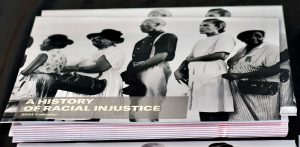 That level of commitment was on display from the majority white Alliance members who attended the gathering, said Lisa Dunson, associate minister at Covenant Baptist United Church of Christ in Washington, D.C., and vice president of the Alliance’s Executive Committee.
That level of commitment was on display from the majority white Alliance members who attended the gathering, said Lisa Dunson, associate minister at Covenant Baptist United Church of Christ in Washington, D.C., and vice president of the Alliance’s Executive Committee.
“What stuck out the most to me was the engagement of everyone. Elijah did a presentation and people were quite engaged in asking questions. Given that we are relatively new in anti-racism work, I thought maybe this would be a big jump for a relatively white organization.”
Instead, the gathering demonstrated that Alliance members are ready for the anti-racism work that lies ahead in the new year and beyond, she said. “I wanted to make sure we weren’t running folks from the table, scaring folks away. That was my misconception, to be honest. What I saw was that no matter where people were on the spectrum, they just seemed to gel.”
The event also communicated that the present-day abolitionist movement is not, as many believe, about abolishing police, she said. “The movement is about exposing the systems that are in place that keep people oppressed. It’s not just Black folk but about anyone sitting on the margins of society, including victims of mass incarceration and police brutality.”
The movement is also focused on retraining police rather than eliminating them, she added. “But all of this — ending mass incarceration, police brutality — comes under the umbrella of anti-racism.”
The fall gathering also helped demonstrate that the Alliance is on the right path, Zehyoue said.
“There’s a good amount of people who want to learn about white supremacy and the history of the church’s role in that, and I think that’s encouraging. They want to be part of movements that eradicate the role that white supremacy continues to play in our society.”
Related articles:
Alliance of Baptists updates its covenant and hears calls to action against injustice

